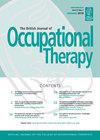Positive risk-taking within social care for adults with physical disabilities: A review of guidelines in practice in England
IF 1.3
4区 医学
Q3 REHABILITATION
引用次数: 0
Abstract
Introduction:Despite practice guidelines, professionals do not feel confident in implementing positive risk-taking. This may be due to the guidance provided.Method:A scoping review of current organisational guidance for the professional practice of positive risk-taking within Adult Social Care services for people with a physical disability. Guidelines were obtained from Local Authorities in England in October 2020. The data were extracted using TIDieR to describe positive risk-taking as an intervention. The quality of the guidelines was assessed using AGREE II.Findings:In all, 36 Local Authorities responded out of 106 contacted. A total of 21 documents were included for review. Substantial variability was found in terminology, definitions and risk grading between documents. The greatest consistency was found in how to implement a positive risk-taking intervention. Consistency was also found in the policy that documents cited. There was little reference to evidence to support intervention components. Overall, AGREE II quality scores were low and stakeholder involvement, specifically with regard to the views and preferences of service users, was largely absent.Conclusion:There is a need for a greater consensus to guide the professional practice of positive risk-taking. Determining the extent of current evidence and establishing an evidence base may facilitate more consistent guidelines and support professionals’ confidence in implementing positive risk-taking.肢体残疾成人社会护理中的积极冒险:英格兰实践指南回顾
导言:尽管有实践指南,但专业人员对实施积极承担风险的做法并不自信。方法:在为肢体残障人士提供的成人社会护理服务中,对当前积极承担风险的专业实践组织指南进行范围审查。指南于 2020 年 10 月从英格兰地方政府获得。使用 TIDieR 提取数据,将积极冒险作为一种干预措施进行描述。结果:在联系的 106 个地方当局中,共有 36 个做出了回应。共有 21 份文件被纳入审查范围。不同文件在术语、定义和风险分级方面存在很大差异。在如何实施积极的冒险干预方面发现了最大的一致性。在文件引用的政策方面也发现了一致性。很少有文件提及支持干预措施的证据。总体而言,AGREE II 的质量得分较低,利益相关者的参与,特别是服务使用者的观点和偏好,在很大程度上缺失。确定当前证据的范围并建立证据基础,可促进制定更加一致的指导原则,并增强专业人员实施积极的风险承担方法的信心。
本文章由计算机程序翻译,如有差异,请以英文原文为准。
求助全文
约1分钟内获得全文
求助全文
来源期刊

British Journal of Occupational Therapy
REHABILITATION-
CiteScore
2.20
自引率
15.40%
发文量
81
审稿时长
6-12 weeks
期刊介绍:
British Journal of Occupational Therapy (BJOT) is the official journal of the Royal College of Occupational Therapists. Its purpose is to publish articles with international relevance that advance knowledge in research, practice, education, and management in occupational therapy. It is a monthly peer reviewed publication that disseminates evidence on the effectiveness, benefit, and value of occupational therapy so that occupational therapists, service users, and key stakeholders can make informed decisions. BJOT publishes research articles, reviews, practice analyses, opinion pieces, editorials, letters to the editor and book reviews. It also regularly publishes special issues on topics relevant to occupational therapy.
 求助内容:
求助内容: 应助结果提醒方式:
应助结果提醒方式:


